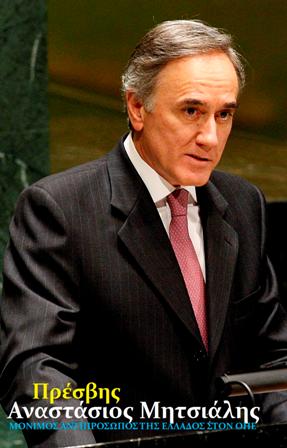Ομιλία Μονίμου Αντιπροσώπου, Πρέσβη κ. Α. Μητσιάλη στην Υψηλού Επιπέδου Συνάντηση των Ηνωμένων Εθνών για τις Μη-Μεταδιδόμενες Ασθένειες
από Greek American News Agency | 21 Σεπ, 2011 | Πολιτική |

Mr President,
Noncommunicable diseases are a challenge of epidemic proportions in our times. Such a conclusion is common place today. Those who have to deal with such diseases, in the government or in the professional sector, face this reality every day.
Another common place: NCDs are part of today’s way of life. Unhealthy diet and obesity, smoking and excessive alcohol consumption, lack of physical exercise are worldwide-spread phenomena. The impact of the economic crisis in health is likely to worsen the situation even more, by strengthening its social determinants.
In Greece, 40% of the population suffers from chronic conditions. Almost 55% of the Greeks are overweight. 49% are smokers. In the European Region of WHO, NCDs account for an estimated 77% of the total disease burden and 86% of the deaths. In the EU, NCDs result in more than 800,000 premature deaths annually.
Cardiovascular diseases cause half of all deaths in Europe. The relevant cost for the EU economy is estimated at approximately 200 billion Euros a year. Ιn a time of recession, when governments are looking for ways to curtail spending, NCDs and chronic diseases threaten not only lives but also our economies and the development of our societies.
All these facts force us to change our attitude. Addressing NCDs leads to a better life for citizens, but also ensures the sustainability of our health systems.
Greece welcomes this year’s UN High-Level Meeting on Noncommunicable Diseases. It is a significant occasion to discuss the issue and act in every level of governance, whether global, national or local.
Greece is committed to the principles discussed in Moscow last April. We recognize that states and governments should be mobilized. We believe that there is no better way to do so than through international collaboration. And we acknowledge the importance of the leading role of the UN and the WHO on the matter as very significant.
Currently the Hellenic government is working on the implementation of an ambitious health reform programme. By the comprehensive reorganisation of our national health system, we are setting new priorities. And in the case of the NCDs, we are giving priority to the prevention of the main risk factors.
Through education programmes and media campaigns, we are stressing the importance of physical activity and proper nutrition. So, we are emphasizing the importance of the Mediterranean diet once again.
My country is implementing new regulations for school canteens. By discouraging the consumption of sugar beverages and high-fat or high-salt foods, we are encouraging children, but also their families, to make better choices and lead healthier lives. At the same time, new structures for Nutrition and Physical Activities in the Ministry of Health aim to promote the message that a healthier lifestyle and protection against the scourge of NCDs are the two sides of the same coin.
Also, in the fight against smoking, there is room for optimism, as data shows that there is a notable decrease in tobacco consumption.
As part of our effort we are considering also new ideas on innovative financing for health and for tackling NCDs in particular. At the World Ministerial Conference of Moscow in April, Greece supported the proposal for the introduction of an International Solidarity Levy on Tobacco.
Futhermore, Greece has agreed with the WHO to establish in Athens the new WHO Athens Office for the NCDs, an Office exclusively dedicated to the support of policies for the prevention and control of noncommunicable diseases all over the 53 countries of the European Region of the WHO. The relevant agreement was ratified by the Greek parliament last March. Its inauguration will take place this coming Friday, September 23rd.
Thank you









